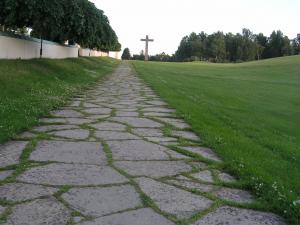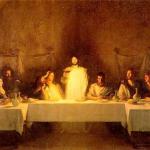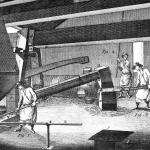 In the Tao te Ching, Lao Tzu (or whoever wrote and edited the text), often engaged the Tao, that is, the way which all should strive to follow, through its practical applications. While a great mystical current lay behind the text and would be picked up by later Taoists, much of what is found in the Tao te Ching related to government and how officials should guide and direct not only their people, but themselves, in order to establish a harmonious society. Lao Tzu understood the interdependent relationship between the government and the people; what one or the other did would have direct impact on the other. Bad government will have negative impact on the populace, and a bad populace will lead to bad government; good government will help improve the people, and people rising beyond the negative influence of bad leaders can help establish good government:
In the Tao te Ching, Lao Tzu (or whoever wrote and edited the text), often engaged the Tao, that is, the way which all should strive to follow, through its practical applications. While a great mystical current lay behind the text and would be picked up by later Taoists, much of what is found in the Tao te Ching related to government and how officials should guide and direct not only their people, but themselves, in order to establish a harmonious society. Lao Tzu understood the interdependent relationship between the government and the people; what one or the other did would have direct impact on the other. Bad government will have negative impact on the populace, and a bad populace will lead to bad government; good government will help improve the people, and people rising beyond the negative influence of bad leaders can help establish good government:
When the government is muddled,
The people are simple;
When the government is alert,
The people are cunning.
It is on disaster good fortune perches;
It is beneath good fortune that disaster crouches.[1]
Bad government will lead the people by bad examples; a muddled government full of incompetent leaders with no education or skills or wisdom will likewise be reflected in the people who are being governed, for they will follow the example of their incompetent leaders. Indeed, those who are authoritarians without desire to embrace government for the common good often desire an ignorant populace, and so what comes as a result, the muddled populace which is seen established by terrible leaders, is done out of design.
When we see social chaos developing, with all kinds of confusion as to what is truly happening, those who care for the people ad desire the common good should become alert and fix things; they will help the people become cunning and wise, able to deal with the difficulties at hand. If not, then the chaos will take the good fortune which has been handed down for generations and lose it all. Disaster looms behind good fortune, because bad government often rests on the accomplishments of the past. Without proper leadership, the people, unaware of the problems looming, will not develops the skills or knowledge to rectify the situation. When a crisis develops, bad government is eventually overthrown, and the potential for good fortune once again is established – but only if the people truly become cunning and reform the state so that improvements can establish such good fortune.
Thus, it is easy to see, when chaos is on the streets, when violence is on the rise, disaster lurks. Wisdom of the way needs to be had to prevent it, or, if it is too late to prevent it, to lessen the impact of the disaster and to hasten recovery. But a muddled government will only make it worse; those in charge will not seek solutions to the problem but rather whatever ways they can find to make a personal gain out of it, leading to the charge that government is run by criminals. Indeed, it is a common charge throughout time because of how often leaders turn away from the common good and seek only their own private good; ignoring the common good is what muddles government and leads to great evil, personal and social. Salvian, in reflecting upon the evils of his time, spoke a universal truth about the evils which are to be had by those with great wealth and power: as long as they seek only self-gain, those who run businesses or government are those who promoting those evils which are destroying society as a whole: “But what else is the life of all men engaged in business but fraud and perjury? What is the life of the curiales but injustice? What is the life of all government officials but slander? What is the life of all connected with the army but pillage? Perhaps you think that such crimes are permissible in men of this sort.”[2]
Instead of seeking to defend those who live these lifestyles by saying that what they do is required by their profession, Christians must denounce them when they do evil, realizing that those who have greater wealth or power have more responsibility because of it. Instead of shrugging off such evil, we must call it out, showing how it has diverted us from the universal way of truth, goodness and beauty for only by realizing we are not following the way can we return to it.
Sadly, we often seem unwilling to do so, and so we show ourselves to be far off from the way as well. Even when we are suffering the consequences of our abandonment of the way, we want to continue as we are doing, never purifying and correcting ourselves. We become enslaved to the evil. Indeed, we learn to accept it, taking pride in it, for despite the problems which arises as a result of our wayward paths, things are still being accomplished and a few great achievements continue to be made which bedazzle the populace. Just because we have departed from the way and things are falling apart, this does not mean nothing good will be established, no greatness will be seen – indeed, it is because of such limited goods that the wayward populace can be kept off the right path. What we need is see the sickness which has developed so then we will be willing to return to the true way, building ourselves back up, which Abraham Isaac Kook said is to be done through penitence:
General penitence, which involves raising the world to perfection, and particularized penitence, which pertains to the personal life of each individual, including the smallest constituents of special penitential reforms that the holy spirit can itemize in the tiniest details – they all constitute one essence. Similarly all the cultural reforms through which the world rises from decadence, the improvements in the social and economic order through this redress of every form of wrongdoing, from the most significant to the minutest ordinances of later sages and the most extreme demands of ethically sensitive spirits – all of them constitute an inseparable whole. [3]
Yet, we get so caught up in our false way we avoid such reform. We do not want to seek after that which is greater, for there will be hardship involved. We might even have to diminish ourselves, to excise aspects of who we think we are, which will of course make it seem as if we were weakening ourselves and thus make it hard that it is indeed what we should do. But if we reflected on how much medicine works for the body, such as we find done in cancer treatments, this is exactly the necessary step: we must cut off that which is harmful and defective so than we can become healed, and in the healing, we will not only be made whole, but stronger than ever before. We must not accept our unhealthy situation, but seek after the greater and true freedom which returning to the way can give:
The stubborn determination to remain with the same opinion and to invoke it in support of a sinful disposition to which one has become habituated whether in action or in opinion is a sickness resulting from a grievous enslavement that does not permit the light of penitence to shine in full strength. Penitence is the aspiration for the true original freedom, which is the divine freedom, wherein there is no enslavement of any kind.[4]
For us to get there, both personally and as a society, we must accept with humility what the way presents to us; it will often seem as if we are backtracking, and so, contradicting our goal, but yet the more we purge ourselves of all that is unhealthy, the faster the sickness will be healed. This is, of course, is especially true for those who are in some sort of leadership position. They have to humbly accept correction instead of stubbornly kicking all those who recommend it away from them, otherwise, they will find their apparent strength only leads to a dead end and instead of making everyone great, they will end up making a great mess which will be even more difficult to fix.
[IMG=Skogskyrkogården, Walk way at Holy Cross vy Håkan Svensson [GFDL (http://www.gnu.org/copyleft/fdl.html) or CC-BY-SA-3.0 (http://creativecommons.org/licenses/by-sa/3.0/)], via Wikimedia Commons]
[1] Lao Tzu, Tao te Ching. trans. D.C. Lau (London: Penguin Books, 1963), 65.
[2] Salvian, “The Governance of God” in The Writings of Salvian the Presbyter. trans. Jeremiah F. O’Sullivan, PhD (Washington, DC: Catholic University of America Press, 1962), 85.
[3] Abraham Isaac Kook, “The Lights of Penitence” in Abraham Isaac Kook: The Lights of Penitence, The Moral Principles, Lights of Holiness, Essays, Letters and Poems. Trans. Ben Zion Bokser (New York: Paulist Press, 1978), 49.
[4] Abraham Isaac Kook, “The Lights of Penitence,” 54.
Stay in touch! Like A Little Bit of Nothing on Facebook













